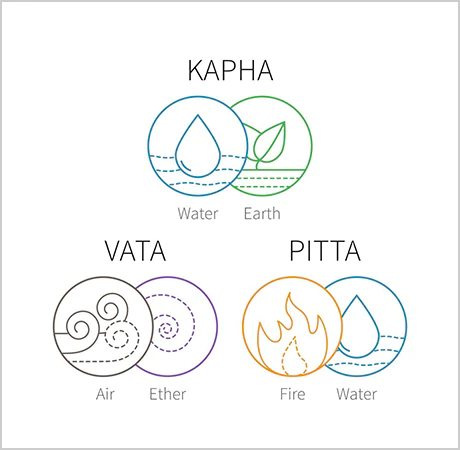Ayurveda is the ancient healing system rooted in India for more than 5000 years ago. It focuses on balancing the doshas and Panch Mahabhutas (Earth, Water, Fire, Air, and Space) of the body.
In the evolving modern lifestyle, Ayurveda has lost its significance, and it’s high time we pause and think
- What is Ayurveda?
- How it works?
- Impact of ayurvedic practices
As we seek a more sustainable and mindful living, revisiting Ayurveda will not only support healing, but it will help in deeply connecting with nature and surroundings.
So join me as I unveil the age-old Ayurveda to you and explore how ayurvedic practices hold a big impact on modern lifestyle.
- What is Ayurveda?
- Three Doshas in Ayurveda That Manage Energy in Body
- What Does Ayurvedic Treatment Include?
- Advantages of Ayurveda
- Ayurvedic Practices to Incorporate in Your Lifestyle
- Are There Any Side Effects of Ayurveda?
- What Precautions to Take While Practicing Ayurveda?
- Wrapping Up
- Frequently Asked Questions
What is Ayurveda?
The term “Ayurveda” is derived from the Sanskrit word, which means Science of Life. It is an ancient wellness knowledge with Indian origins that deals in balancing the doshas and elements of the body.
Ayurveda focuses on harmonizing the body, mind, and spirit to bring the much-needed balance in life. It offers several lifestyle changes, natural treatments, therapies, remedies, etc. to help in achieving a balanced diet, sound sleep, and mindfulness.
Every person has a unique Prakriti, which specifically determines the physical, psychological, behavioral, and immunological traits. Ayurvedic practitioners carefully analyze these unique traits of every individual to offer different treatments according to their prakriti.
To get the best out of Ayurvedic practices, it’s not enough to understand what is Ayurveda. So let’s take a dig into doshas, ayurvedic treatments, and some useful ayurvedic practices that you must incorporate into your life in the subsequent sections.
Three Doshas in Ayurveda That Manage Energy in Body
Ayurveda describes doshas as the basic constitution of which each person’s body is made. There are three doshas: Vata, Pitta, and Kapha. These three are responsible for the physical, mental, and intellectual well-being of a person. Imbalance in these doshas is the root cause of illness in people.

Every ayurvedic practitioner tries to find the leading dosha and balance the three of them to achieve harmony. Here’s a deeper analysis of these doshas for better understanding!
VATA: Energy of Movement
Vata is an essential component and is responsible for the motions of the body. It is most prominent during fall or every time the season changes, due to which a person should always keep an eye on diet and lifestyle during seasonal changes.
- Anyone with Vata as their dominating component has a quick mind, a flexible body, and creative thinking. They are very active, talk fast, and are easily fatigued. Such people are attracted towards astringent foods like salad and raw veggies, sweet dishes, and salty food.
- Vata-dominant individuals are prone to constipation, aching joints, dry skin, pneumonia, and arthritis.
- To balance Vata, one should eat ghee along with properly cooked food and drink plenty of water. Furthermore, avoid eggplant, spinach, cranberries, pomegranates, and raw apples. Also avoid cold, frozen and raw foods, keep a regular routine, and stay warm.
PITTA: Energy of Digestion and Metabolism
Pitta has the quality of fire and people with Pitta as their dominating dosha have warm bodies, sharp minds, and impressive ideas. When Pitta goes out of balance, you may feel furious or agitated and become short-tempered.
- People with Pitta dominance have a medium build, strong metabolism, quick digestion, and really strong appetite. They are attracted towards hot spices and cold drinks and are prone to skin rashes, ulceration, fever, inflammations, and jaundice.
- To balance Pitta, one should avoid sour, salty, and pungent foods like chilies, garlic, and raw onions. Incorporating sweet, cooling, and bitter-tasting food such as salad and raw vegetables is beneficial in pacifying Pitta.
- Additionally, people with high Pitta should avoid excessive oil and heat, limit salt intake, and opt for cooling and non-spicy foods.
KAPHA: Energy of Lubrication
Kapha people have abundant strength, endurance, and stamina. They have oily smooth skin, gain weight easily, and have a slow metabolism. Their taste buds are naturally inclined towards sweet, salty, and oily foods, but their constitutions are best balanced by bitter, astringent, and pungent foods.
People with high Kapha are naturally calm, tolerant, and forgiving, but they are slow in comprehending things with long-term memory retention.
- Kapha-dominated people are prone to flu, sinus, weight gain, diabetes, water retention, and headaches. Winter is the most sensitive time for them, and they need to be most cautious about their diet and lifestyle this time.
- Since Kapha people have a natural liking towards bitter, astringent, and pungent food, they need vegetables, dry-cooked grains, beans like black beans, pinto beans, and red lentils, and pumpkin seeds.
- They should totally avoid dairy products, heavy foods, iced food or drinks, and fatty foods. Active lifestyle, regular exercise, and light food are best for balancing this dosha.
What Does Ayurvedic Treatment Include?
The Ayurvedic treatment includes precise identification of the primary and secondary doshas to understand which one is imbalanced. Then a treatment plan is carefully crafted, which involves,
- Herbal Medicines: Herbal treatment or ayurvedic supplements are the key constituents of Ayurveda, and depending on your dosha, different combinations of natural herbs are used.
- Yoga: Ayurveda focuses on balancing body, spirit, and mind. Hence, to harmonize your body and mind, different types of yogic kriyas (Yoga exercises) are recommended.
- Meditation: To eliminate stress and connect with nature, different types of meditation are suggested. It syncs you with the natural rhythm of the universe and helps you understand the spirit element.
- Panchkarma: It is the purification program that cleans the undigested food from your body by massages, medicinal oils, herbs, and laxatives.
What are the Advantages of Ayurveda?
Incorporating Ayurveda has a plethora of physical, mental, and intellectual benefits. Due to the faded significance, not many studies and clinical research are done on Ayurvedic practices as compared to western medicine.
However, a lot of people have noticed the following improvements in their health after employing Ayurvedic treatment.
- Balances BP and lowers cholesterol.
- Helpful for people with hypertension.
- Improves Rheumatoid arthritis.
- Balances doshas, lifestyle, and dietary habits of people.
- Reduces the risk of heart diseases.
- Bring down chronic pain, stress, and anxiety.
- Improves blood circulation and digestion.
- Increases focus, improves sleep quality, and manages symptoms of irritable bowel syndrome.
Ayurvedic Practices to Incorporate in Your Lifestyle
Ayurveda is not just about medicine; it’s a way of living. Here are some easy-to-follow ayurvedic practices that you must include in your routine in order to improve the quality of life.
- Fix your circadian rhythm and sync your sleep cycle with nature’s timing. For that, keep a regular sleep and wake schedule, meditate before sleeping, practice deep breathing exercises like box breathing, and avoid using gadgets at night.
- Do Yoga or exercise on a regular basis. Keep your body active, increase movements, and go for walks. This will provide you clarity, help with weight management, and boost your metabolism.
- Eat fresh homemade ayurvedic food. Avoid watching screens or any type of distractions while eating. Respect your food and be thankful for having a meal. Totally avoid sugary, packaged, and processed foods. Have the biggest meal as lunch and keep your dinner light.
- Add natural herbs like turmeric, ginger, cumin, black pepper, etc., into your diet to combat inflammation, improve digestion, and reduce nausea.
Are There Any Side Effects of Ayurveda?
Yes, some ayurvedic medicinal therapies might have potential side effects. Though ayurvedic practices are mostly safe, when done without the supervision of a professional practitioner or with poor sanitation conditions, you may notice some side effects as well; that includes:
- Hypersensitivity rash
- Stomach discomfort
- Diarrhea
- Drowsiness
If the initial symptoms are ignored for long, it can lead to severe issues like hallucinations, elevation in liver enzymes, arsenic poisoning, etc.
What Precautions to Take While Practicing Ayurveda?
You can take the following precautions to get the best results out of your ayurvedic practices.
- Do not practice ayurvedic treatments and medicines without the guidance of a professional practitioner.
- Pregnant and breastfeeding women should avoid ayurvedic kriyas.
- Mostly ayurvedic products are highly adulterated with heavy metals such as lead, arsenic, and mercury. Avoid consuming them and try to find the organic herbs.
- Always trust the products that have independent testing.
- Listen to your body; if you don’t feel good after a certain kriya or medicine, immediately inform your coach and discuss what can be done to fix the issue.
Wrapping Up
With our fast-paced modern lifestyle, Ayurveda has become more relevant than ever. Understanding what is Ayurveda or having knowledge of ayurvedic practices is not enough. To take full advantage of this age-old wisdom, you need to employ its simple techniques in your daily lifestyle.
Life today is incredibly fast and unpredictable, so it’s high time we Pause, Rejuvenate, and Reconnect with Nature through Ayurveda!!
Read Next: How Ayurveda Restores Energy and Immunity Naturally (Featuring Fit Care Combo)
Frequently Asked Questions
Q1: What is Ayurvedic medicine?
Ans: Ayurveda is the science of life and is known as a complementary and alternative medicine (CAM) system that focuses on balancing five elements and three doshas of the body with herbs, diet, exercise, and meditation.
Q2: What diseases are cured by Ayurveda?
Ans: Ayurveda focuses on holistic healing and helps in balancing body, mind, and spirit to prevent and treat diseases like eczema, heart disease, arthritis, indigestion, etc.
Q3: Which country is best for Ayurveda?
Ans: India is the best country for Ayurveda, as the age-old knowledge of Ayurvedic medicine is rooted in Indian traditions. It is the birthplace of this ancient healing system and offers the most authentic ayurvedic medical system.













